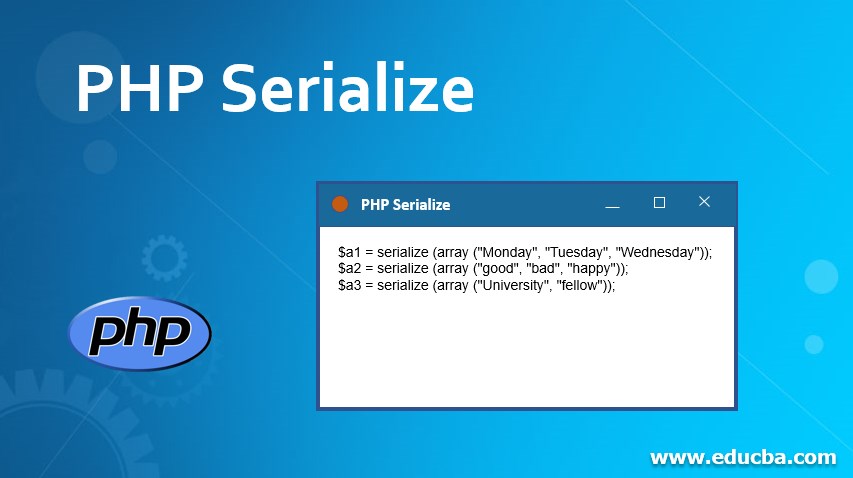Updated March 28, 2023

Introduction to PHP Serialize
The serialize is a function used in the PHP for changing the format of the value and making the value to be stored in a variable. The serialize value means a bit the collection of such a bit is called a serialize data. This function transforms the bit in such a way that the bits can be stored in the memory buffer. The serialize function plays a key role in transforming the value to the bits and makes them easy to be stored in the memory. The version which we use for this function is generally PHP4.
Syntax
The syntax for the serialize() is:
serialize(variable1)How does Serialize work in PHP?
Suppose we want to store the string values in the memory they have to get changed in such a way that they can be stored in memory. For that we use the serialize function. First assign the string values in a array to the variable named as serialized value use the function serialize().Then print the output using the print.
Examples to Implement PHP Serialize
Below are the examples to implement Serialize() in PHP
Example #1
Code:
<?php
$serialized_value = serialize(array ('Dell', 'Laptop', 'Good'));
echo $serialized_value;
?>Output: Here s is the letter which counts the number of letters of the string according to it the bits are allocated in memory. i letter is the location of the string in the memory.
![]()
Explanation: As we already know that if we want to store some array of strings in a variable it must be in a format according to the format of the bits. To change the variable which contains a array of strings into a storable format we use the serialize function which converts the variable values into bits and stored in the memory and at the end we can retrieve the output value back using the echo. The above example can be used to explain the serialize function. Here first we assign an array of strings to the variable serialize value.
Code:
$serialized_value = serialize(array ('Dell', 'Laptop', 'Good'));
- The serialize function coverts them into bits and stores into memory.
- The output can be displayed using the following command
echo $serialized_value;- echo is used to display the output
Example #2
Code:
<?php
$variable1 = array ('Monday', 100,array(2, 'three'), 'February');
$variable2 = serialize($variable1);
echo $variable2;
?>Output: Here s is the letter used to count the number of bit stored in the memory and I is the location allocated to the memory.
![]()
Explanation: Here we have taken a different data types of values stored in a variable.to convert them into a format suitable to store in a memory we use the serialize function. It converts the values into the bits and allocates the location in memory for storing the values. First we assign the array of strings and numbers into the variable1.
Code:
$variable1 = array (‘Monday', 100,array(2, 'three'), 'February’);Code: Next, we convert the variable 1 into the format suitable to store bits into memory we use serialize function as shown below.
$variable2= serialize($variable1);- Next to print the output we use echo keyword.
echo $variable2;Example #3
Code:
<?php
$a1 = serialize (array ("Monday", "Tuesday", "Wednesday"));
$a2 = serialize (array ("good", "bad", "happy"));
$a3 = serialize (array ("University", "fellow"));
echo $a1;
echo $a2;
echo $a3;
?>Output: Here s is the letter which stores bits in the memory, and I letter allocates the location of the strings.

Explanation: Here we want to store the strings in the memory and display them. So first we allocate the different strings in a array to the different variables like a1,a2,a3.Then we use the serialize function to convert the values into bits and store them in the memory for that we use the serialize function. The values are allocated as shown below.
Code:
$a1 = serialize (array ("Monday", "Tuesday", "Wednesday"));
$a2 = serialize (array ("good", "bad", "happy"));
$a3 = serialize (array ("University", "fellow"));- Then we display the output using the echo which is shown below
echo $a1;
echo $a2;
echo $a3;Conclusion
The PHP is easy to install. The PHP is dynamic. The serialize function is used to change the format of the variable and make it suitable for storing it in the memory. Here the letter s is used to count the number of bits stored in the memory and I is used to memory location for storing the value. The code is written in the script format and the output is displayed in the web browser. Easy to understand. There are 8 data types. There are 5 different types of operators.
Recommended Articles
This is a guide to PHP Serialize. Here we discuss the introduction to PHP Serialize, along with its working, appropriate syntax and respective examples. You can also go through our other related articles to learn more –


